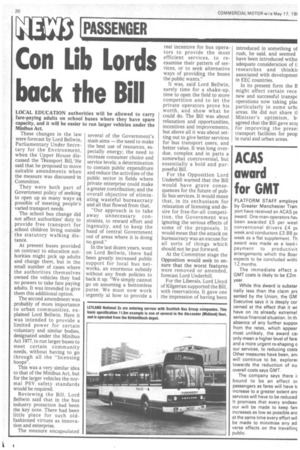Con Lib Lords back the Bill
Page 22

If you've noticed an error in this article please click here to report it so we can fix it.
LOCAL EDUCATION authorities will be allowed to carry fare-paying adults on school buses where they have spare capacity, and it will be easier to run larger vehicles under the Minibus Act.
These changes in the law were forecast by Lord Bellwin, Parliamentary Under Secretary for the Environment, when the Upper House discussed the Transport Bill.'He said that he proposed to move suitable amendments when the measure was discussed in Committee.
They were both part of Government policy of seeking to open up as many waysa* possible of meeting people's varied transport needs.
The school bus change did not affect authorities' duty to provide free transport for school children living outside the statutory walking distance.
At present buses provided on contract to education authorities might pick up adults and charge them, but in the small number of cases where the authorities themselves owned the vehicles they had no powers to take fare paying adults. It was intended to give them this additional option.
The second amendment was probably of more importance to urban communities, explained Lord Bellwin. Here it was intended to provide a limited power for certain voluntary and similar bodies, designated under the Minibus Act 1977, to run larger buses to meet certain community needs, without having to go through all the "licensing hoops".
This was a very similar idea to that of the Minibus Act, but for the larger vehicles the normal PSV, safety standards would be required.
Reviewing the Bill, Lord Bellwin said that in the bus industry protection had been the key note. There had been little place for such oldfashioned virtues as innovation and enterprise.
The measure encapsulated several of the Government's main aims — the need to make the best use of resources, especially energy; the need to increase consumer choice and service levels; a determination to contain public expenditure and reduce the activities of the public sector in fields where private enterprise could make a greater contribution; and the overall objective of eliminating wasteful bureaucracy and all that flowed from that.
"Our approach is to take away unnecessary constraints, to reward effort and ingenuity, and to keep the hand of central Government out of areas where it is doing no good."
In the last dozen years, went on Lord Bellwin, there had been greatly increased public support for local bus networks, an enormous subsidy without any fresh policies to back it up. "We simply cannot go on assuming a bottomless purse. We must now work urgently at how to provide a real incentive for bus operators to provide the most efficient services, to reexamine their pattern of services, or to seek alternative ways of providing the buses the public wants."
It was, said Lord Bellwin, surely time for a shake-up, time to open the field to more competition and to let the private operators prove his worth, and show what he could do. The Bill was about relaxation and opportunities, incentives and improvements, but above all it was about setting out to give better services for bus transport users, and better value. It was long overdue, complex and in parts a somewhat controversial, but essentially a bold and purposeful Bill.
For the Opposition Lord Underhill warned that the Bill would have grave consequences for the future of public bus services. It would mean that, in its enthusiasm for relaxation of licensing and desire for free-for-all competition, the Government was ignoring the serious effects of some of the proposals. It would mean that the attack on bureaucracy was an excuse for all sorts of things which should not be put forward.
At the Committee stage the Opposition would seek to ensure that the worst features were removed or amended, forecast Lord Underhill.
For the Liberals, Lord Lloyd of Kilgerran supported the Bill, with reservations. It gave one the impression of having been introduced in something of rush, he said, and seemed have been introduced witho adequate consideration of ti researches and thinkii associated with developmen in EEC countries.
In its present form the B might affect certain rece new and successful transpc operations now taking plac particularly in some urix areas. He did not share tl Minister's optimism, bi agreed that the Bill gave sec)i for improving the presei • transport facilities for peop in rural and urban areas.








































































































